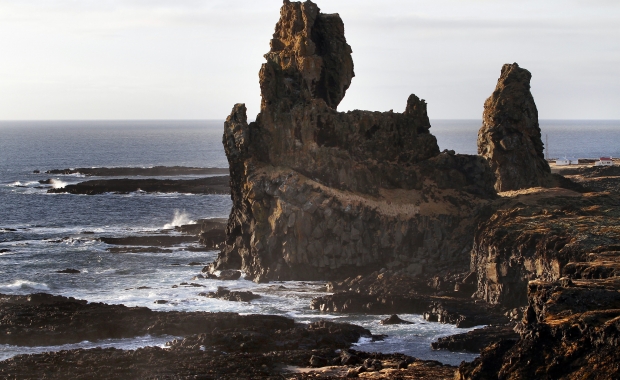Cave explorers in the Neshraun lava field on Snæfellsnes peninsula recently discovered a cave with archaeological remains which are believed to be 900 year old. The cave was discovered last winter, but is only now that it‘s existence has been revealed to the public. It‘s location, however, remains secret to protect the remains while they are being investigated.
Not the only mystery hidden in the lava
Þór Magnússon, the explorer who found the cave, which has been named Leynir, which translates roughly as Hidden, told the Icelandic National Broadcasting Service, RÚV, that it‘s discovery proves that many undiscovered mysteries remain hidden in the lava fields of Iceland. I‘m convinced that this is not the only Hidden around here.
The cave was found to contain a small hearth, bones from a horse and other remains, including what archaeologists believe is a bed. Analysis by the Cultural Heritage Agency of Iceland indicates the remains are from the 11th or 12th centuries. Magnús A. Sigurðsson, the Cultural heritage manager for West Iceland, told RÚV that the cave was most likely occupied by an outlaw, or someone trying to hide.
Ate and cooked horsemeat
Adolf Friðrkisson, an archaeologists, told the Icelandic National Broadcasting Service that the discovery was unique and that it was very difficult to explain the remains. Written records seem to be of little if any use, and no similar remains have previously been found. The presence of horse bones only adds to the mystery.
The cave‘s occupant seems to have cooked horse meat while occupying the cave. Adolf points out that this very interesting, since the consumption of hose meat had been forbidden by law since Iceland adopted Christianity in the year 1000.
“Actually, if you explore evidence provided by archaeology it seems to have been very unusual for people to consume horse meat, both before and after the adoption of Christianity. The cave dweller certainly kept his consumption of horse meat a secret.”
Archaeologists plan to explore the cave this September.
Cave explorers in the Neshraun lava field on Snæfellsnes peninsula recently discovered a cave with archaeological remains which are believed to be 900 year old. The cave was discovered last winter, but is only now that it‘s existence has been revealed to the public. It‘s location, however, remains secret to protect the remains while they are being investigated.
Not the only mystery hidden in the lava
Þór Magnússon, the explorer who found the cave, which has been named Leynir, which translates roughly as Hidden, told the Icelandic National Broadcasting Service, RÚV, that it‘s discovery proves that many undiscovered mysteries remain hidden in the lava fields of Iceland. I‘m convinced that this is not the only Hidden around here.
The cave was found to contain a small hearth, bones from a horse and other remains, including what archaeologists believe is a bed. Analysis by the Cultural Heritage Agency of Iceland indicates the remains are from the 11th or 12th centuries. Magnús A. Sigurðsson, the Cultural heritage manager for West Iceland, told RÚV that the cave was most likely occupied by an outlaw, or someone trying to hide.
Ate and cooked horsemeat
Adolf Friðrkisson, an archaeologists, told the Icelandic National Broadcasting Service that the discovery was unique and that it was very difficult to explain the remains. Written records seem to be of little if any use, and no similar remains have previously been found. The presence of horse bones only adds to the mystery.
The cave‘s occupant seems to have cooked horse meat while occupying the cave. Adolf points out that this very interesting, since the consumption of hose meat had been forbidden by law since Iceland adopted Christianity in the year 1000.
“Actually, if you explore evidence provided by archaeology it seems to have been very unusual for people to consume horse meat, both before and after the adoption of Christianity. The cave dweller certainly kept his consumption of horse meat a secret.”
Archaeologists plan to explore the cave this September.







